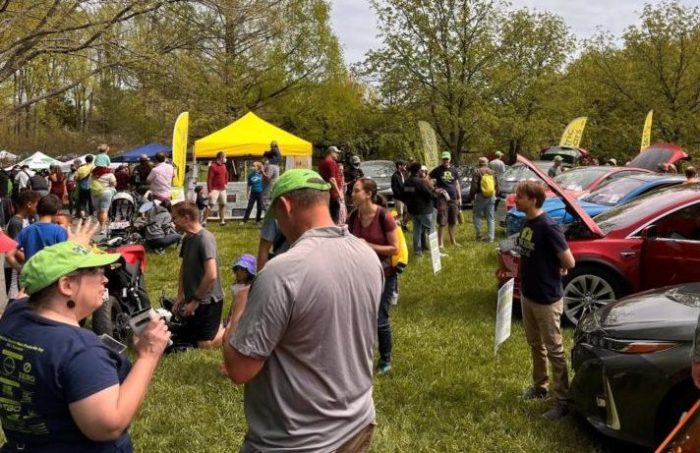
On Earth Day weekend, Brookside Gardens hosted its largest GreenFest ever, attracting more than 5,000 people to Montgomery County’s 7th annual environmental festival, a collaboration among local government, business, nonprofit and university partners.
Weaving through some 60 exhibitors, attendees talked to experts about solar, wind and hydroelectric power, and considered compost pickups and home energy assessments, while their kids got their faces painted, stood in line to climb trees, stretched out on yoga mats, and potted plants to carry away.
Thrilled with the turnout, Joyce Breiner, executive director and co-founder of Poolesville Green, a non-profit in Upper Montgomery County, was there to promote electric vehicles, having called on her network to bring their cars and trucks. Her team showed up to field questions and give passersby a good look at the more than a dozen plug-ins. including the Mustang Mach-E, a mini-pick-up called a Pickman, and several Tesla models.
“I think the main takeaway is that electric driving is here,” she said. “If we are going to make any headway on the issue of climate change, we have to electrify transportation, right here in Montgomery County.”
According to MDOT registration records, in June 2021 EVs accounted for 12,000 of Montgomery County’s nearly 800,000 vehicles or 1.2 percent. By April 2022 those numbers were up to 15,000.
Targeting transport to lower emissions
Montgomery County’s Climate Action Plan has set an ambitious goal to reduce emissions by 80 percent by 2027 and 100 percent by 2035. The transport sector, which contributes 42 percent of the county’s climate-changing gases, is key to those reductions. Among the initiatives already in place are plans to purchase more battery-electric buses, and the building of a 5.6 Megawatt solar-powered microgrid to support charging at the Brookeville Smart Energy Bus Depot. The county’s passenger vehicle fleet will add to the 45 EVs in service, with another 50 in fiscal year 22, and 50 more in FY23, conditional on funding.
It is Brian Booher’s job as senior planning specialist for zero emissions vehicles to coordinate across government agencies, with car dealers and consumers to electrify transport to lower emissions. In January that work began with a five-month pilot phase of the Montgomery County EV Purchasing Cooperative (EVPC). Its call-to-action asked residents to pledge to make their next car purchase electric. “We wanted to establish that there was a strong demand for electric vehicles, the potential to build a community around electric vehicle purchasing, and to create necessary relationships with dealers to make that kind of program possible,” Booher said.
Non-profits like the Electric Vehicle Association of Greater Washington, D.C., and Poolesville Green, were among 19 community partners that worked to get consumers to sign on.
1,000 pledge future EV purchase
The EVPC final report released in June found the pilot accomplished its initial goal to attract 1,000 consumer pledges, and a dozen more from local businesses that provide EV service and maintenance. Twenty-five dealerships recruited into an Electrified Dealer Network were given training in EV technology, free on-line promotion on the County’s Zero Electric Vehicle site and the promise of sales leads from the bank of EV Purchasing Cooperative pledges already in the system.
Joining the EVPC made sense for Robert Fogarty, president of Sport Automotive, a family-owned dealership in Silver Spring that has been recognized by the Greater Washington Region Clean Cities for its focus on the environment through its marketing General Motors and Honda plug-in electric vehicles. “It commits you to offering electric vehicles at a reasonable price to customers,” he said, although he observed, inventory issues, brought about by pandemic disruptions have hit the auto industry particularly hard.
“We have never seen anything like this supply-wise in the history of the business, he said, watching his Honda inventory fall from 380 two years ago to 28 today. “They can’t build them fast enough, can’t get the raw materials fast enough,” he said. “It’s frustrating for customers. It’s frustrating for us.”
Yet, Fogarty remains optimistic. He expects the industry will rebound by 2024, if not before, and wants to be in a good position when it does. His company is banking on its return with a $250,000 investment in electric infrastructure at its facility. “We currently have nine chargers on site, and will add another five, with the capacity for many, many more,” he said.
Overcoming hurdles to EV ownership
Consumers are telling Brian Booher that the biggest challenges to EV adoption are cost and charging station access. On affordability, Booher says, the EV Purchasing Cooperative will not abandon its mandate to get a discount rate for EVs. “We will continue to build this relationship, and when the supply chain is ready, we can talk about how to organize a bulk purchase. Then we will communicate and promote that offer to Montgomery County residents,” he said.
In the meantime, the charging network is expanding beyond the 20 county-owned public stations, located in parking garages in Silver Spring, Wheaton and Bethesda. Installation at an additional 65 facilities, including libraries, fire stations, swimming pools and recreation centers, is expected to begin later this year.
“We’ve had a lot of interest from people who live in condos and townhome communities, or even in single family neighborhoods that don’t have driveways or garages. We need to figure out ways to expand access in those places, too,” Booher said, seeing a growing movement among homeowner associations to take advantage of rebates offered by electric utilities servicing Montgomery County, and state incentives. Maryland’s “Right-to-Charge” law went into effect in 2021, giving homeowners the right to install a charging station, provided they pay for and maintain it.
The Clarksburg Condominium II celebrated installation of six chargers with a ribbon cutting ceremony in July. When Condo President Robert Borkowski started the process in 2020, only one tenant in the 44-unit building owned an electric car. His job was to convince the board that it was an investment worth making. “Change is coming, and it’s necessary to put the infrastructure in place,” he said.
Borkowski helped secure $44,000 in rebates from the State of Maryland and Potomac Edison, EV Drive Project toward the cost of the $60,000 project. He also arranged up-front financing from the Montgomery County Green Bank and City First Enterprise Small Business Energy Savings Support Program.
Now three tenants own EVs, and Borkowski says the payoff is huge. “What was a liability is now an asset. The parking stall has the potential to save each EV owner at least $1,000 a year between gasoline and electricity,” he said.
State, federal incentives gear up
Consumers in the market for an EV can also tap into incentives offered by state and local government, including the reinstatement of a $3,000 state excise tax credit, a provision of the Maryland Clean Cars Act of 2022, which goes into effect next July. A $7,500 federal tax credit is still on the books.
Maryland has set a goal to put 300,000 electric vehicles on the road by 2025. Brian Booher says the Electric Vehicle Purchasing Co-op offers a roadmap for the future, with its dual approach to get residents and dealers engaged. “We’re continuing to look at opportunities to organize events, and give people ways to experience electric vehicles in person, and provide information on incentives to ownership,” he said.
Poolesville Green is actively engaged in pushing that agenda on Sept. 17 at Poolesville Day with a Drive Electric Show leading during National Drive Electric Week. Joyce Breiner says she expects her group will match last year’s numbers, with 260 vehicles registered for the on-site demo. “We’re now the largest in the world of the National Electric Drive Week events,” she said, with expectations for more visitors, sponsors, manufacturers, dealerships, and ride and drives.
“We all have to do our part. As soon as we can all make the transition to electric vehicles, the better for our children and the future,” she said. 9
Rosanne Skirble is former Voice of America environmental reporter who lives in Silver Spring.
EV Meet-ups in person, online
Whether you own an EV or are in the market for one, in-person meet ups are back, along with on-going on-line conversations. They rev up across the country during National Drive Electric Week from September 23-October 2, with Poolesville Green leading the pack at the 30th Annual Poolesville Day Festival on September 17th. If you can’t wait until then, here are a number of recurring events that can get you into the seat of an EV or an opportunity to brag about the one you’ve got.
• Ask an EV Owner is hosted online the first Wednesday of each month from 7:30p.m.-9:30p.m. by the Electric Vehicle Association of Greater Washington. The organization, which began as a chapter of the Electric Auto Association in 1980, holds its monthly meetings at the Davis Library on the third Wednesday of the month. Their website is updated regularly with resources, deals and a calendar of regional events at evadc.org
• Potomac Cars & Coffee is focused on the love of the automobile (including EVs) and the stories that go with them, in-person on the second and fourth Sunday of the month, 9a.m.-11a.m.
www.facebook.com/Potomac-Cars-Coffee-373848716080626/www.facebook.com/Potomac-Cars-Coffee-373848716080626/1st
• Tesla Tuesdays is hosted by Maryland Tesla Owner Club on the second Tuesday of the month www.facebook.com/MarylandTeslaOwners/events/
• Facebook EV owner groups include, but are not limited to, Chevy Bolt EV and EUV Owners Group, Chevy Volt 2.0, Tesla Divas, Women Drive Electric, KIA EV6 Owners, Mustang Mach-E Owners. Check online for details.




